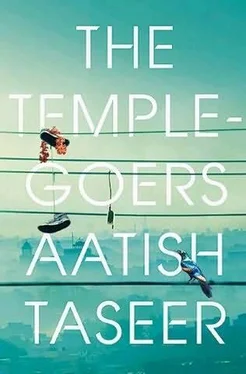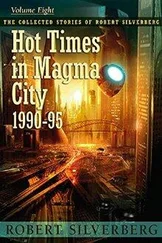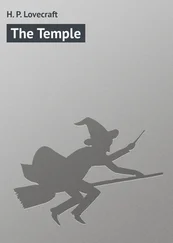‘Baby, listen, I’ve been thinking the same thing,’ she said, ‘and since this was all my idea in the first place, I feel I should do the cleaning up on my own. I wasn’t going to tell you this till later in the month, it was going to be a surprise, but since you’ve brought it up, I’ll tell you now. I have this friend, Nargis, who’s a publisher in the East Village. She’s like a big Buddhist and a Free Tibet person. And basically, she’s decided to extend the privileges of her citizenship, especially since America has done so little for Tibet, by marrying a Tibetan in Delhi so that he can escape the tyranny of the Chinese and come and live in the States.’
I felt the frost round my glass of Cruzcampo start to melt.
‘But if he’s living in Delhi, hasn’t he already escaped the tyranny of the Chinese?’ I asked, feigning concern.
‘Yes, yes, all right,’ Sanyogita said, laughing, ‘but Nargis doesn’t know that. She’s a big-hearted person, you know, a real do-gooder, so maybe she hasn’t thought of that part. It all seems the same from America, anyway. But that’s not the point.’
‘What is the point?’
‘That I’ve done a flat swap with her! She needed a place to stay in Delhi and so I’ve lent her Jorbagh for two months. In place of which, we have the most adorable little flat in the East Village with a cat called Kuku. You can work, I can do my thing. We’ll have breakfast at the Clinton Street Bakery, we’ll watch films, it’ll be so nice.’
It wasn’t that I didn’t have a flat in Delhi where I could return to; I had my mother’s. It wasn’t that Sanyogita, in feeling she had to clean up this summer mess, had already bought our tickets to New York; I would gladly have reimbursed her, thinking of the money I would save by not having to live in New York for two months; it was that I knew Sanyogita, and I knew the place from where the gesture had come. This was no entrapment; it was a heartfelt and hopeful gesture, from the depths of Sanyogita’s fairy-tale imagination, dreaming always of escape.
And so, despite great misgivings, I gave in.
After a summer of boredom and waiting, I left New York under these circumstances.
I had heard nothing from the agent. For two months, I waited, viewing every ending week with sinking hopes and every new one with fresh, but misplaced, anticipation. I checked my emails constantly, and if I was away from the computer for too long, I felt an ache at the thought of what news the little blue orb in my inbox might have brought. I tried to live my agent’s life, thinking of when she would come into work, when she might be having lunch with a publisher, when – shaking off the effects of a bottle of red wine – she would write to me to tell me of what he had said. I thought of how she would have half-days on Fridays in the summer, and of where and for how long she would go on holiday. I thought obsessively of these things even as my agent sat in an office barely a few miles away. But I couldn’t bring myself to contact her first. I felt certain that this action would turn good news to bad. I played games with myself. Every changing light – would I make it across the street while the little man was still white? – every arriving train – would the next train be an express train uptown? – every Sunday book review – would it contain any indication of what was popular these days? Indian writing still in? – became heavy with significance. I started to believe that the world around me, the minutiae of life in a big city, contained signs of whether I was to be a writer or not. If this feeling had come from a genuine wish to be a writer, it might have had a foundation in hard work and reading that would have given me solace. But it was an empty wish; it was like my novel, a wish for a lifeline.
One hot afternoon, when Sanyogita had gone to see an aunt in Long Island, leaving me to take care of Kuku, I stepped out to have an iced coffee. I felt in my pocket for the keys and let the door slam behind me. But even before its metal teeth had closed around the powerful cylindrical bolt, I knew that what I had thought were my keys was in fact loose change. I stood in an airless corridor, permanently lit by a yellowing fluorescent light, staring with aimless intensity at a floor of many tiny hexagons. I didn’t have a phone; I had only enough money for an iced coffee. I didn’t want to leave the building, as that would lock me out of the building as well as the flat. I could hear Kuku mewing, no doubt rubbing his scrawny body along the door, reminding me that I had to feed him. I felt an irrational hatred towards the cat for not being able to help me.
It was then that I had what I can only describe as a swarming of nerves. Already close to some kind of lip, they cascaded over. My body turned cold with sweat, I felt some kind of essential life-giving liquid drain from me and I had the desire to curl up on the floor by the door, with the strange belief that if I kept my face close to the centimetre gap of cold air between the door and the floor, I would be able to restart the flow of oxygen into my body. The city beyond terrified me. When I thought of it, I could think only of the crowds and commotion around Times Square. And it was like this, hardly able to walk, that I made my way down three flights of stairs, banging on every door in the hope that someone would be able to help me cope with the blackness rising around me.
On the ground floor, a girl in a summery dress opened the door. She had a garden flat, with an open window and a large white fan. I broke into the tranquillity of her room and collapsed on a purple futon, trying slowly to explain my situation. She listened, nodded, emitting a few comforting ‘uh-huhs’, then picked up a red telephone and called a locksmith. After a rapid conversation, she said he would be there in eight minutes.
The man who arrived was a Romanian, slim, blond, in a vest. He had been at a nearby café drinking an iced coffee, he said. He looked at the lock with dismay. He said that this was not the kind of lock his tools could open; he would have to drill it. Two hundred dollars. I had no choice. It was Friday and Sanyogita was not back until Monday. He took his drill to the brass lock and bore into a single point just above the keyhole. It was as violent a thing as I had ever seen; I could hear, as brass flakes flew, the lock’s interlocking components break one by one. Then he took a wrench to the lock, and after many failed attempts pulled its little brass face from its place in the door, leaving an empty hole. But the door didn’t open.
‘It has a double-lock,’ he said, ‘but you didn’t tell me.’
‘I didn’t know.’
‘We’ll have to drill that one too. It’ll be expensive. It’s a good lock. Yeah, yeah. Another two hundred at least.’
He bore into the second lock now. The brass flakes flew and the lock’s components broke one by one; it was wrenched from its place in the door; a second empty hole appeared. The door fell open, the room reappeared, Kuku rubbed up against a sofa. But the door couldn’t be left like that; the locks had to be replaced. Two hundred dollars each. I gave him the money in two-hundred-dollar instalments withdrawn from an electric-blue ATM outside a deli. It felt like cutting away parts of my body. He gave me two sets of brass keys in return.
I went back upstairs and wrote to the agent.
The following week, once Sanyogita had returned, the blue orb in my inbox brought this letter, a letter within a letter, of which painful snatches remained with me:
Aatish – Since I had to go off on a long weekend after your delivery of An Internment , I asked a colleague here – formerly a highly placed publisher and now with us part-time as a reader – to read your novel, and below you will find his report. For reasons you will appreciate (since the report does not pull its punches), I have debated whether to send this to you – but, on balance, feel it will be more helpful than otherwise to you to contemplate a neutral professional judgement. Of course, you are entitled to reject the judgement, but I hope you will find something of value in it.
Читать дальше












